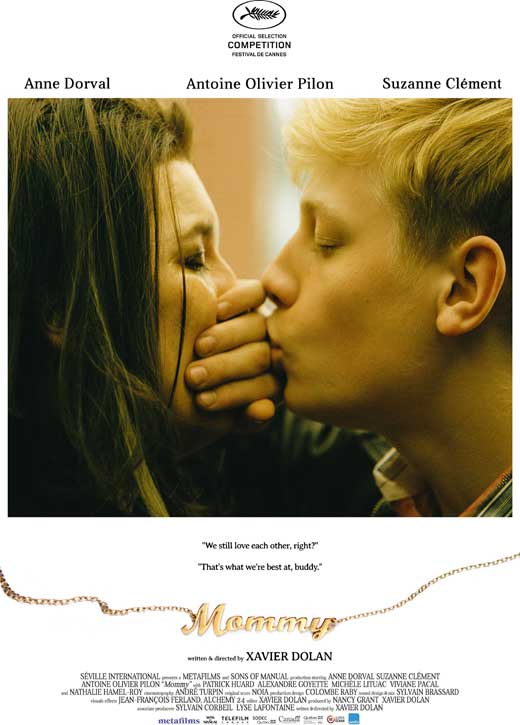Soundtracking: "Mommy"
 Wednesday, May 9, 2018 at 10:00AM
Wednesday, May 9, 2018 at 10:00AM by Chris Feil
 Notable among the complaints lobbed at Xavier Dolan are his music video stylings and his pop-heavy song choices. Say what you will about the auteur’s self-seriousness, but when his musical instincts work, they truly work. Nowhere does this musical instinct shine as brightly as Mommy.
Notable among the complaints lobbed at Xavier Dolan are his music video stylings and his pop-heavy song choices. Say what you will about the auteur’s self-seriousness, but when his musical instincts work, they truly work. Nowhere does this musical instinct shine as brightly as Mommy.
The film’s psuedo-scifi premise (a fictional law allows parents to institutionalize their children) sets the film in the immediate future but the film musically shows its family unit as stuck in the past. Teenage Steve is christened with Counting Crows and Eiffel 65’s brainworm “Blue”, and he’s grafted with a dated whiteboy swagger. His mother Die is adorned in former hits from Dido and Sarah McLachlan, and we see the classy adult contempo hopes in her tacky bargain bin compilation CD package...
Sure, Dolan’s films breathe with a music video aesthetic, but here especially he shows why the form’s influence on his work shouldn’t be an eyeroll. Dolan crafts a symbiosis between the image and the sound, projecting what his characters lack the emotional intelligence to communicate. Invited over for dinner, Die and Steve’s neighbor Kyla quickly becomes enmeshed in their troubled dynamic. In their quick connection, there’s the unspoken relief of Kyla as the missing link to the mother/son duo and Kyla finding her own sense of purpose in their chaos. Steve initiates a silly, showy sing-a-long to Céline Dion’s “On Ne Change Pas” and the three ease into their new dynamic willfully. Dolan’s camera pulls back, as if the claustrophobic frame of the film has been lifted by the freedom of a soaring Céline track.
It’s perhaps the first non-confrontational image in the film, and its most musically immersive, an exhale but still only a promise of what this relationship could be. One of the film’s signature grand leaps will come when the music literally breaks the 1:1 frame. At this point the tides have turned for the trio: Die has newfound financial stability, Scott is (mostly) behaving, and Kyla belongs. As “Wonderwall” chimes in, their happiness seems like a fantasy sequence, until Scott pushes away the frame, and we all collectively exhale the preceding anxiety. Its a simple obvious effect, but with an undeniable power over the entire film and our perception of its people.
But naturally reality creeps back in, the aspect ratio (and absent music track) like walls caving in on Die. The previous interplay between music and image haunts the rest of the film like bitterness and regret.
The visual device returns once Die decides to institutionalize Steve, the frame opening for a fantasy sequence of all the dreams she had for her son’s life. Pop music falls away in favor of an orchestral piece, Ludovico Einaudi’s “Experience”, the difference at once telling us it is imagined. Not unlike the love ballet that closes La La Land, it expresses the ache for what could have been better than useless words could. After so much noise and shouting matches and interrupting melodies, the wordless melody gets to the heart of Die’s regrets and mistakes and delusions with crystal clarity. The frame is open, because her dreams have always been the real escape.
Does this all provide an obvious or simplistic emotional experience for the audience, as Dolan’s critics have claimed? Perhaps, but this notion ignores the impact of the whole and the more interpretable closer to the film, Lana Del Rey’s “Born to Die”. It’s the first contemporary usage of the film and the most fatalistic, and pointedly so for the character’s uncertain fate - it’s as if Dolan saying, after the wounds are exposed, that this is what’s real and what’s now. By facing the irrevocable, have they finally caught up?
Happy Mothers' Day!
All Soundtracking installments can be found here!
 Celine Dion,
Celine Dion,  Lana Del Rey,
Lana Del Rey,  Mommy,
Mommy,  Oasis,
Oasis,  Soundtracking,
Soundtracking,  Xavier Dolan
Xavier Dolan 


Reader Comments (6)
Antoine-Olivier Pilon‘S character’s name is Steve. ;)
Great read though! Dolan’s best film by a considerable margin. I generally like his films a lot, but I LOVED Mommy. (I hated the last one and am dreading the upcoming one, so I’ve felt due to rewatch Mommy for awhile now!!)
Definitely one of my favorite films of the 2010s so far... the way it used "Wonderwall" is inspiring.
It only occurred to me now that the use of Lana Del Rey's song is literal as well, as in Steve was born to Die (Diane). Huh.
One of the best movies I've seen!
@starlit: well done :)
The controversial music video stylings of Xavier Dolan has always placed him at the center of hate but still I am reading reviews of writing site on https://top5writingservices.com/is-edubirdie-legit-and-safe-to-use/ to hire a writer to write me an essay on this music. He has made his new music video on a controversial and sensitive topic just to get fame.